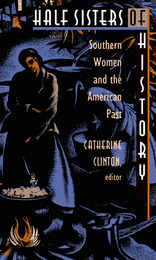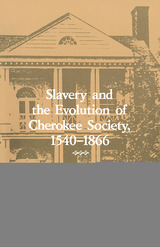
This collection of essays by pioneering scholars surveys the roots and development of southern women’s history and examines the roles of white women and women of color across the boundaries of class and social status from the founding of the nation to the present. Authors including Anne Firor Scott, Elizabeth Fox-Genovese, Jacquelyn Dowd Hall, and Nell Irwin Painter, among others, analyze women’s participation in prewar slavery, their representation in popular fiction, and their involvement in social movements. In no way restricted to views of the plantation South, other essays examine the role of women during the American Revolution, the social status of Native American women, the involvement of Appalachian women in labor struggles, and the significance of women in the battle for civil rights. Because of their indelible impact on gender relations, issues of class, race, and sexuality figure centrally in these analyses.
Half Sisters of History will be important not only to women’s historians, but also to southern historians and women’s studies scholars. It will prove invaluable to anyone in search of a full understanding of the history of women, the South, or the nation itself.
Contributors. Catherine Clinton, Sara Evans, Elizabeth Fox-Genovese, Jacquelyn Dowd Hall, Jacqueline Jones, Suzanne D. Lebsock, Nell Irwin Painter, Theda Perdue, Anne Firor Scott, Deborah Gray White

Slavery was practiced among North American Indians long before Europeans arrived on these shores, bringing their own version of this “peculiar institution.” Unlike the European institution, however, Native American slavery was function of warfare among tribes, replenishment of population lost through intertribal conflict or disease, and establishment and preservation of tribal standards of behavior. American Indians had little use, in primary purpose of slavery among Europeans.
Theda Perdue here traces the history of slavery among the Cherokee Indians as it evolved from 1540 to 1866, indicating not only why the intrusion of whites, “slaves” contributed nothing to the Cherokee economy. During the colonial period, however, Cherokees actively began to capture members of other tribes and were themselves captured and sold to whites as chattels for the Caribbean slave trade. Also during this period, African slaves were introduced among the Indians, and when intertribal warfare ended, the use of forced labor to increase agricultural and other production emerged within Cherokee society.
Well aware that the institution of black slavery was only one of many important changes that gradually broke down the traditional Cherokee culture after 1540, Professor Perdue integrates her concern with slavery into the total picture of cultural transformation resulting from the clash between European and Amerindian societies. She has made good use of previous anthropological and sociological studies, and presents an excellent summary of the relevant historical materials, ever attempting to see cultural crises from the perspective of the Cherokees. The first over-all account of the effect of slavery upon the Cherokees, Perdue’s acute analysis and readable narrative provide the reader with a new angle of vision on the changing nature of Cherokee culture under the impact of increasing contact with Europeans.
READERS
Browse our collection.
PUBLISHERS
See BiblioVault's publisher services.
STUDENT SERVICES
Files for college accessibility offices.
UChicago Accessibility Resources
home | accessibility | search | about | contact us
BiblioVault ® 2001 - 2024
The University of Chicago Press









